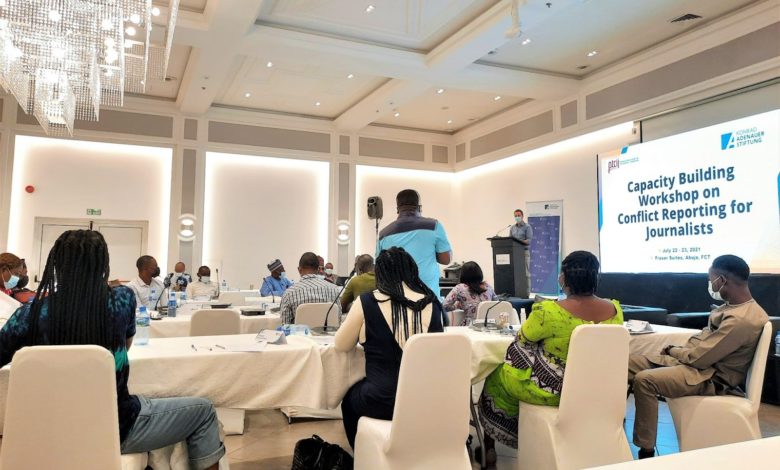Conflict Reporting: Foundation Partners With PTCIJ To Train Nigerian Journalists
The Konrad Adenauer Foundation said it was organising the workshop because of widespread insecurity in Nigeria and the need to prepare journalists for the risky task of covering the issues.

Scores of journalists from online, print, and broadcast platforms gathered in Abuja between Thursday July 22, and Friday July 23, to build capacity and brainstorm on the subject of conflict reporting.
The workshop was organised by Konrad Adenauer Stiftung (KAS), a Berlin-based foundation, in partnership with the Abuja-based Premium Times Centre for Investigative Journalism (PTCIJ).
KAS has for some time been promoting security sector reforms in Nigeria through collaborations with lawmakers and security agencies. While delivering his welcome address, the foundation’s Resident Representative, Dr Vladimir Kreck, said it was important for the media to improve the quality of reporting “looking at the issues in the country, especially the insecurity.”
“Conflict-reporting is probably the most dangerous job for a journalist, considering the journalists who go to the field for reporting, who risk their lives and receive threats to their lives. But at the same time it is also important to consider that the reports at the end … might be phrased in a way that might increase insecurity or escalate a conflict,” he observed, arguing that building capacity in that area was therefore critical.
He emphasised the need for journalists to shine their torches on human rights violations by state forces as well as adhering to the ethics of the profession.
Agreeing, PTCIJ Executive Director Dapo Olorunyomi, said there was no better time than the moment to build skills “in this special area of conflict-reporting.”
Also giving an opening address, Abdulrazak Namdas, chairman of the Committee on Army at the House of Representatives, said insecurity could not be resolved with only the use of guns. He described the media as a vibrant body, especially during the military era, but said the capacity of newsrooms still needed building.
For example, the lawmaker who is representing a constituency in Adamawa State said, the media should take charge in labelling actors in conflicts appropriately and not rely on statements from government officials.
“We need to ask, who are those giving us those names? If the bandit will graduate to bringing down a fighter jet and we are still calling him a bandit, then there is a problem. It is the responsibility of the media to give people the correct names,” he said. “I can assure you it will help. Are politicians setting the pace, giving cliches, or are the media supposed to?”
“Today, when you look at the Nigerian security sector, we have overlapping mandates. The policeman will do the job of … and the army will do the job of the policeman. The Nigerian Armed Forces are in 34 out of 36 states, pursuing one crisis or the other. [Whereas] the internal security challenges are not the job of the Armed Forces. They are purely police affairs,” he continued.
“It is only the media who can begin to say let the Armed Forces begin to do their job. Also, give the police the necessary resources, not only the Army. And in Nigeria today, if you are doing joint operations, you begin to wonder who is the lead agency. If it is internal issues, when you involve the Army and the police, naturally the soldiers take over even when it is not his job description. These are the things we are doing right now so that we can have cooperation and synergy in the security sector, but this can only be done if Nigerians are well-informed and have a media that is properly educated and aware of the solutions.”
Like Dr Kreck, he further urged the media to continue to interrogate the human rights records of various security forces.
The two-day workshop featured sessions on the causes and triggers of conflict, ethics of conflict reporting, the role of state institutions, humanitarian laws and treaties, reporting from the perspective of the military, personal security of journalists, data in conflict reporting, digital security, and so on.
The facilitators included Osai Ojigho, Country Director of Amnesty International; Professor Olawale Albert of the University of Ibadan; Professor Abiodun Adeniyi, Head of Mass Communication at Baze University; former army spokesperson General Sani Kukasheka Usman (retd); Ajibola Amzat, Editor of the International Centre for Investigative Reporting (ICIR); and Dapo Olorunyomi. Others were David Ojelabi, Commandant, Peace and Conflict Management Department at the Nigeria Security and Civil Defence Corps (NSCDC); Oluwatosin Alagbe, PTCIJ Programme Director; and Adedeji Adekunle, PTCIJ Deputy Programme Director.
The event also featured a panel discussion moderated by PTCIJ Programme Manager, Busola Ajibola. The panellists were Daily Trust’s Abdulaziz Abdulaziz, ‘Kunle Adebajo from HumAngle, Ibrahim Adeyemi from the Foundation for Investigative Journalism (FIJ), Michael Orodare from Neusroom, and Justina Asishana from The Nation Newspaper.
Support Our Journalism
There are millions of ordinary people affected by conflict in Africa whose stories are missing in the mainstream media. HumAngle is determined to tell those challenging and under-reported stories, hoping that the people impacted by these conflicts will find the safety and security they deserve.
To ensure that we continue to provide public service coverage, we have a small favour to ask you. We want you to be part of our journalistic endeavour by contributing a token to us.
Your donation will further promote a robust, free, and independent media.
Donate HereStay Closer To The Stories That Matter




